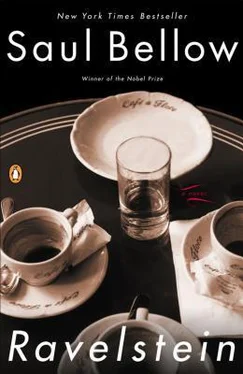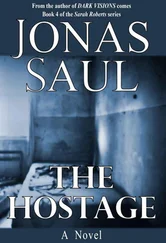"You didn't know where to begin?"
"Well, I had a Jewish life to lead in the American language, and that's not a language that's helpful with dark thoughts."
"Did you ever talk to Ravelstein about this power of viciousness?"
"I may have. Abe's character was far more cheerful than mine-a wide-open broad-daylight outlook. He was more like a normal person. But also he was anything but innocent."
"I did Thucydides with him," said Rosamund. "And I can re member what he had to say about the plague in Athens and the dumping of dead parents or sisters on the funeral pyres of strangers. But as for linking this with the masses of dead in the twentieth century-that wasn't something he did in class. Can you remember anything he might have said?"
"How do you suppose," I asked Rosamund, "that a man like Ravelstein might match up his existence-his daily awareness that he is dying-with the fact that his attention now is drawn to the many millions who were destroyed in this century. I am not thinking here of the fighting men or of peasants, kulaks, bourgeois, or party members or those designated as people eligible for forced labor, for death in the Gulags or fascist concentration camps-people easy to round up and send away in cattle cars. These would not normally have attracted Ravelstein's attention. They were the usual 'losers,' people whom governments had no reason to be concerned with-what somebody called a 'quicksand society' which sucked its victims down and drowned or suffocated them. The shortest way with such people was to get rid of them, turn them into corpses. There were also the Jews who had lost the right to exist and were told as much by their executioners-'There is no reason why you should not die.' And so from the Gulag in Russian Asia to the Atlantic Coast, there was a record of destruction or something like a death-disseminating anarchy. You had to think of these hundreds of thousands of mil lions destroyed on ideological grounds-that is, with some pretext of rationality. A rationale had considerable value as a manifestation of order or firmness of purpose. But the maddest forms of nihilism are the most strict German military ones. According to Davarr, who was a very great analyst, German militarism produced the extremest and most horrible nihilism. For the rank-and-file this led to the bloodiest and craziest kind of _revanchist__ murderous zeal. Because it was implicit in carrying out orders that all responsibility went back to the top, the source of all orders. And everybody was thus absolved. They were crazies through and through. And this was the Wehrmacht way of getting around responsibility for their crimes. Suppose there were civilian methods to attenuate guilty conduct, Ravelstein told me. Adding, 'But here I'm talking through my hat.' On all topics he had firm views but toward the end, when he referred obliquely to his condition he was more often sad than ironic, wasn't he, Rosie?"
"He wouldn't let himself sink into sadness for long, either."
"Well, but there was a general willingness to live with the destruction of millions. It was like the mood of the century to accept it. In combat you were covered by the special allowances made for soldiers. But I'm thinking of the great death populations of the Gulags and the German labor camps. Why does the century-I don't know how else to put it-underwrite so much destruction? There is a lameness that comes over all of us when we consider these facts."
I date this particular conversation about two years after Ravelstein's death. After the Guillain-Barrй he had worked very hard at walking and recovering the use of his hands. He knew that he had to surrender, to decline but he did it selectively. It didn't matter that he was unable to operate the coffee grinder, but he did need his hand skills for shaving, writing notes, dressing, smoking, signing checks. Few fail to recognize that if you don't apply yourself to recovery you're a basket case, a goner. On the morning of the day when he and I had come upon the parrot-filled holly bushes where the birds were feeding on red berries and scattering the snow, the hospital bed with the steel triangle was being dismantled and removed from Ravelstein's bedroom. "Thanks be to Somebody," he had said when it sank from sight in the freight elevator. "I never want to see that bosun's rig again."
He was walking independently-not yet altogether firm, but a Lazarus case if there ever was one. You're just back from the dead, and you run into an entire tribe of green parrots, tropical animals surviving a Midwestern winter. Ravelstein grinned at me and said, "They even have a Jew look to them." Then, though he took almost no interest in natural science, he asked me once again how they had become so numerous. Suddenly I became the nature expert. So I described them again: those were slim sacks hanging from trees and from the crossbars of the timber, power-line supports. Like over stretched nylon stockings, those nesting tenements where eggs were hatched, drooped as much as thirty feet. "Those nests make you think of Eastside tenements," I said to him.
"Let's get Nikki to drive us over for a look. Where are the head quarters?"
"Jackson Park. But there's a big colony in an alley off Fifty-fourth Street."
But we never did go to see the parrot tenements, the swaying, layered tubes where they nested. Instead, Ravelstein told me when I next met him that he and Nikki were flying to Paris.
"But what do you want to do that for?"
I could see that I had asked a stupid and offensive question, and that Ravelstein was disappointed in me. But it was his way to cover for his closest friends. And it was natural that he should cover for me. "The people at the hospital tell me it's all right to go."
"Do they?" I said.
The doctors' reasoning was transparent. Although Ravelstein was dying he was still fit enough to fly. Paris was one of his great pleasures: He had close friends there and many kinds of unfinished human business. If he wanted so badly to go, why not let him? The doctors figured that a trip of ten days couldn't do much damage. For myself, twenty-five hours of air travel would have been too fatiguing, but Ravelstein would ride through the airports in wheelchairs and, unlike me, he flew first class. To go a bit deeper, I'm afraid I must admit that it seemed to me an unserious thing for a dying man to be doing. And nobody knew what "fit enough to fly" meant in a case like Ravelstein's. Was he flying in a 727, or were there powerful wings hidden under his coat?
And though I do think that Ravelstein was disappointed in me, I don't believe that he was surprised. It was a standing premise between us that there was to be nothing hidden or too shameful to confess, and there was nothing I couldn't tell Ravelstein. Partly this meant that there was scarcely anything he wouldn't have detected on his own. So he would have understood also that I looked down on Paris, rather. There is a Jewish freethinker's saying about Paris-_wie Gott in Frankreich__. Meaning that even God took his holidays in France. Why? Because the French are atheists and among them God himself could be carefree, a _flвneur__, like any tourist.
What I failed even toward the last to understand was that Ravel stein had a second, a supplementary life in Paris. He came back more cheerful from this brief farewell excursion, saying nothing about his French friends but with an air of having done what he should have done.
I was told, however, that Dr. Schley had now ordered Ravelstein to go back to the hospital for "further tests." Nikki confirmed this but added that the room Ravelstein wanted would be unavailable till early next week. On Sunday afternoon he gave a party-pizza and beer, picnic style, with paper cups and plates. He had bought new video equipment-_dernier cri__, he said (even I preferred that to "state-of-the-art")-and singers and instrumentalists were exhibited at full length and with a kind of tropical jungle-light immediacy. The film Ravelstein had chosen to run was one of his favorites-Rossini's _Italian Maiden in Algiers__. The panels on which the players and singers appeared were flat, thin, tall, wide, unendurably real-art re-armed by technology, as Ravelstein said. The faces of the singers colored like Venetian glass and the cameras taking you into their beautiful dark eyes and even into their teeth. Ravelstein in his camel-hair bathrobe was in his lounge chair ad miring and explaining the new equipment-and also making fun of the ignorance of the laity. But he wasn't up to it and kept pressing the mute button to make himself heard. In the end it was simply too much for him, and Nikki helped him up and led him out, saying, "It's too much excitement. He thought he could skip his siesta just this once. But he can't."
Читать дальше












